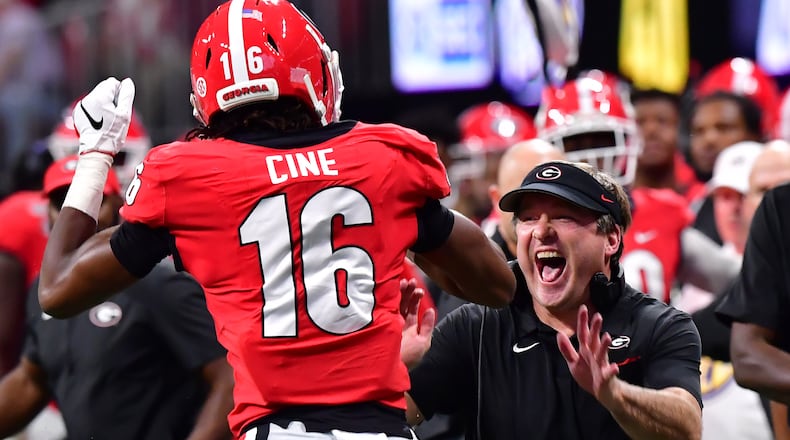ATHENS -- Before Friday, the last time Georgia coach Kirby Smart met with media members was last month at SEC Football Media Days in Birmingham. Since then, the conference has expanded by two teams.
So, naturally, Smart was asked about the recent of additions of Oklahoma and Texas to grow the SEC to 16 teams.
“I am just so focused on this year. I can promise you that I have not wasted one second of thought on that,” Smart said late Friday morning. “You know what I mean? … I can assure you every minute of my day is spent on this team right now. I am not even really thinking about it.”
Understandable, considering the question came about two hours before the Bulldogs’ held their first practice of preseason camp. But Smart did manage to squeak out a couple of superficial thoughts.
“I know that they are coming; I am happy that they are coming,” Georgia’s sixth-year coach said. “I think it will make our conference that much stronger because they are two of the most top-10 winningest programs in college football. So, when you add that to what is already a pretty stacked conference, I think it makes for a pretty special group and will make the SEC that much more powerful.”
An obvious take, for sure, but most likely an accurate one.
Beyond that, Smart won’t have to worry about the Longhorns and Sooners for a while. At least not until the Bulldogs get back on the road to recruit.
Georgia already has been having a recruiting impact in Big 12 territory. A quick glance at the 2021 roster reveals six players from Texas and two from Oklahoma. There are more than a dozen players from west of the Mississippi River, which might be considered the Big 12′s primary recruiting footprint.
The Bulldogs have done well in the Lone Star State in particular. Safety Lewis Cine, cornerback Jalen Kimber and wide receiver Adonai Mitchell are among Texans who are in position to play significant roles, if not start, this season.
Cine is familiar with quite a few players on both teams’ rosters.
“They bring something different,” said Cine, who has started 12 games for the Bulldogs and played in all 24 since arriving from Trinity Christian High in Cedar Hill, Texas. “They’re known for offense out there, scoring a lot of points, making big plays in terms of passing. That brings something new to the SEC.”
Well, not exactly. The past three SEC champions have passed the ball at a rate similar to the Big 12 schools. But, generally, defense has been played at a higher level over this way.
The bigger question is whether the presence of traditional powers such as Oklahoma and Texas will make it more difficult for the Bulldogs to win the national championship, a stated but extremely elusive goal.
Some think it does, others don’t.
“From where I’m sitting, it’s a winning situation for Georgia,” said former Bulldogs coach Jim Donnan, who was a longtime offensive coordinator at Oklahoma and still has family in the state. “We’re a top-5 program already. Now you can build in some scheduling, and the exposure in Texas is even better. We’ve already gotten some pretty good players out of there as it is. Now, between Texas A&M, Arkansas, Texas and Oklahoma, Southwest players are looking at (the SEC) as their conference now.”
Smart already had increased Georgia’s recruiting presence considerably to the west. Cornerback Kelee Ringo (Tacoma, Wash.) and tight end Darnell Washington (Las Vegas) are among the 5-stars the Bulldogs have signed from the West in recent years. They also reeled in highly rated prospects such as wide receiver Jermaine Burton (Calabasas, Calif.), tight end Brock Bowers (Napa, Calif.) and running back Kendall Milton (Fresno, Calif). That’s not to mention their starting quarterback, who came to UGA from Irvine, Calif., by way of USC.
Meanwhile, Georgia’s roster also includes players from Rhode Island, Pennsylvania, Maryland and virtually all points in between.
Accordingly, Smart doesn’t seem to be too concerned about travel for games or recruiting.
“I gave up regionalism a long time ago,” Smart said. “When they started talking about Instagram, Twitter, and you know (social media), it went away. Kids stayed closer to home in the past, right? So, there was a regional effect. But you look at the number of kids that have come to the Southeastern Conference from California, from out west, from Las Vegas, from up North, the SEC all of a sudden had this explosion of recruiting area. It has naturally expanded because I feel like more parts of the country have wanted to be a part of the SEC and what it offers. A lot of that was created through social media, networking, kids knowing kids.”
About the Author
Keep Reading
The Latest
Featured


